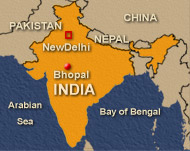Survivors mark Bhopal disaster
Twenty years after a cloud of deadly gas savaged the central Indian city of Bhopal, thousands of demonstrators and survivors have marked the anniversary of the world’s worst industrial accident.

A leak of 40 tonnes of poisonous gas from a Union Carbide pesticide plant on 3 December 1984 killed at least 10,000 people in Bhopal and affected more than 555,000 others, although the exact number of victims has never been clear.
Many died over the years due to gas-related illnesses, like lung cancer, kidney failure and liver disease.
While millions of dollars in compensation has been set aside, much of the money has been tied up by bureaucratic and legal issues and many people have received little or nothing.
Mental retardation
“For the last 20 years I’ve been visiting the hospital and government offices, begging for compensation to take care of my two children,” Leelaben Aherwar, whose baby girl survived the gas leak but immediately afterwards began showing signs of mental and physical retardation, said on Friday.
Her son, born a few years later, suffers from similar problems. “The answer is always the same: ‘The court will make a decision.’ I don’t know what court is this that cannot see our suffering,” she said.
 |
|
More than 555,000 residents have |
So far, she has received about 16,000 rupees ($360). Small groups of protesters were marching in various parts of the city on Friday, waving banners and chanting slogans, before a mass rally later in the day. “Death to Dow,” some banners read in Hindi. “We will fight, we will win,” said another.
Earlier on Friday, thousands of demonstrators planned to march through the main streets of Bhopal, the capital of the state of Madhya Pradesh, before holding a public meeting outside the abandoned Union Carbide plant, demanding justice for hundreds of thousands of people still suffering in the aftermath.
Angry protesters
US chemical company Union Carbide Corp, which was bought by Michigan-based Dow Chemical Co in 2001, paid $470 million in compensation under a settlement with India’s government in 1989. But only part of that amount has reached the victims.
“We will burn effigies of Union Carbide and Dow Chemical to voice our protest. These two companies have betrayed the victims of Bhopal,” said Rashida Bi, a disaster survivor who heads a women victims’ group.
|
“We will burn effigies of Union Carbide and Dow Chemical to voice our protest” Rashida Bee, |
Bi said the protesters would conclude Friday’s rally with a mass pledge to keep up the fight until victims’ demands for compensation, medical care and rehabilitation are met.
The protesters also called on Dow Chemical to clean up the plant site, where rusted pipes and pesticide storage tanks have collapsed or ruptured in the years since the plant was abandoned after the disaster.
“Lethal chemicals are still lying around at the plant, some in the open. Every time it rains these poisonous chemicals are leaked into the soil, affecting groundwater resources of the area,” Bi said.
Company’s denial
Union Carbide insists the tragedy was due to sabotage by a disgruntled employee and not shoddy safety standards or faulty plant design, as claimed by many activists.
Union Carbide, in a statement sent to the media, said it spent more than $2 million to clean up the plant from 1985 to 1994, when it sold its stake in Union Carbide India Ltd (UCIL) and the local company was renamed as Eveready Industries.
The company also says state studies indicated in 1998 that the groundwater around the plant was free of toxins and that any water contamination was due to improper drainage and other pollution, not Union Carbide chemicals.